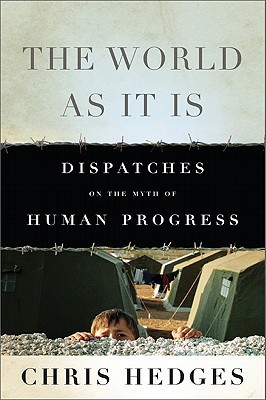

| THE WORLD AS IT IS: Dispatches on the Myth of Human Progress Chris Hedges New York: Nation Books, April 2011 |
Rating: 5.0 High |
|||
| ISBN-13 978-1-56858-640-3 | ||||
| ISBN-10 1-56858-640-X | 350pp. | HC | $26.99 | |
This is a terrible book. The bestselling author of "War Is a Force That Gives Us Meaning" and "Empire of Illusion" takes readers inside the dark heart of American empire, at home and abroad. Filled as they are with facts that undermine the comfortable certainties upon which you relied, at times both morally and viscerally disgusting, Hedges's essays are not pleasant to read. But reading them, or some of them, is essential if we are to understand what history shows us in the next decade or so.
"At no point in American history has our democracy been in such peril or has the possibility of totalitarianism been as real. Our way of life is over. Our profligate consumption is finished. Our children will never have the standard of living we had. And poverty and despair will sweep across the landscape like a plague.1 This is the bleak future. There is nothing President Obama can do to stop it. It has been decades in the making. It cannot be undone with a trillion or two trillion dollars in bailout money. Our empire is dying. Our economy has collapsed." – Page 2 |
The above cheerful note is typical. But did you know that:
From the title essay, "The World as It Is", written 10 March 2008 (page 169):
"Hamas was a nonentity, a tiny group of radicals who wielded no influence and had little following, when in 1988 I first reported from Gaza. But the steady drumbeat of Israeli repression and violence, aided by the corruption and incompetence of Yassir Arafat, led to Hamas' slow rise to supplant Arafat's Fatah party. By 2006 Hamas was elected to power. This election, by all accounts free and fair, saw Jerusalem and Washington begin a covert effort to overthrow Hamas, according to documents obtained by Vanity Fair and the Guardian. The Fatah leader Myuhmmad Dahlan was, according to these documents, given cash, weapons and assistance through Egypt and Jordan to start a Palestinian civil war. Hamas stepped in to thwart the attempted coup. It drove Dahlan and Fatah out of Gaza. The current bifurcation of Palestinian territories, with Hamas in control of Gaza and Fatah in control of the West Bank, began." – Page 169 |
An essay about global warming.
"For three million years, the natural carbon cycle has ensured that the atmosphere contained less than 300 ppm of CO2, which sustained the wide variety of life on the planet. The idea now championed by our corporate elite, at least those in contact with the reality of global warming, is that we will intentionally overshoot 350 ppm and then return to a safer climate through rapid and dramatic emission cuts. This, of course, is a theory designed to absolve the elite from doing anything now. But as Clive Hamilton writes in his book Requiem for a Species: Why We Resist the Truth About Climate Change, even "if carbon dioxide concentrations reach 550 ppm, after which emissions fell to zero, the global temperatures would continue to rise for at least another century."" – Page 122 |
Tearyan Brown, a former gang member who had turned his life around and was married, was convicted of stealing $9 at gunpoint from an 82-year-old woman. Brown was sent to jail despite the fact that the other witness to the crime said the woman was confused and insisted Brown was innocent; despite the fact that Tearyan's friends testified he was with them at the time. Brown served two years for armed robbery before getting a new trial.
Did I mention that Brown was black?
The story it tells is one that's becoming all too common in the books I read and blogs I follow: a story of powerful figures trampling on democracy and civil rights. The methods may differ. A poor man like Tearyan Brown can be jailed on flimsy evidence. A more notable person may still be marginalized. The prime example is Ralph Nader, with whom Hedges spoke extensively, and to whom he devotes two or three essays here. The crux of the story is in one titled "How the Corporations Broke Ralph Nader and America Too" (pages 87-88.)
"Nader was singled out for destruction, as Henriette Mantel and Stephen Skrovan point out in An Unreasonable Man, their engaging documentary movie on Nader. General Motors had him followed in an attempt to blackmail him. It sent an attractive woman to his neighborhood Safeway supermarket in a bid to meet him while he was shopping and then seduce him; the attempt failed, and GM, when exposed, had to issue a public apology." Between 1966 and 1973, Congress passed 25 pieces of consumer legislation, nearly all of which Nader had a hand in writing. By 1973 he was named the fourth most influential person in the country. Then Abe Rosenthal became editor of the NYT and demanded that no story built around Nader's research could be published unless there was a corporate response. Corporations, hearing of Rosenthal's edict, refused to comment. – Page 88 |
In addition to Nader, the essays discuss figures like David Cay Johnston and Noam Chomsky. The book covers a lot of ground. It is thoroughly end-noted, it has a good index and a Bibliography of 78 entries. Not a keeper, but it definitely is a must-read.

 To contact Chris Winter, send email to this address.
To contact Chris Winter, send email to this address.